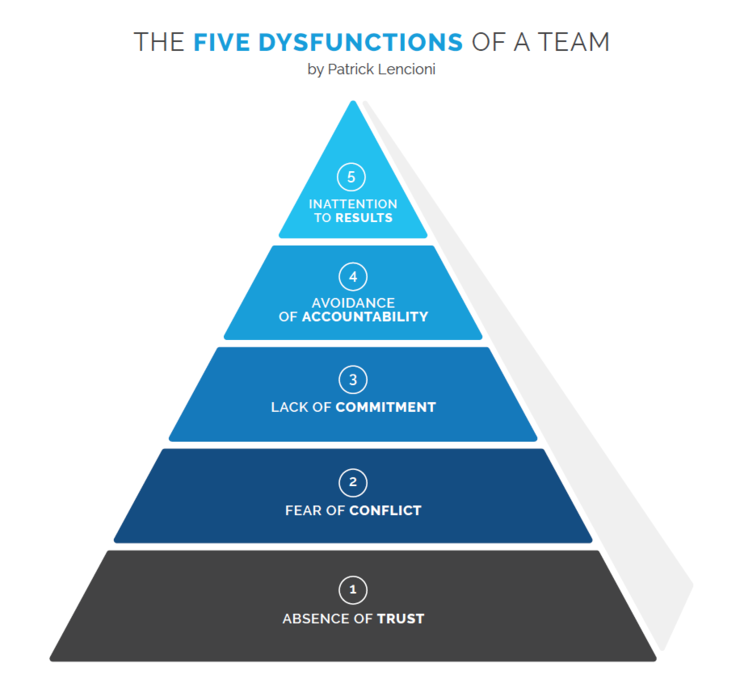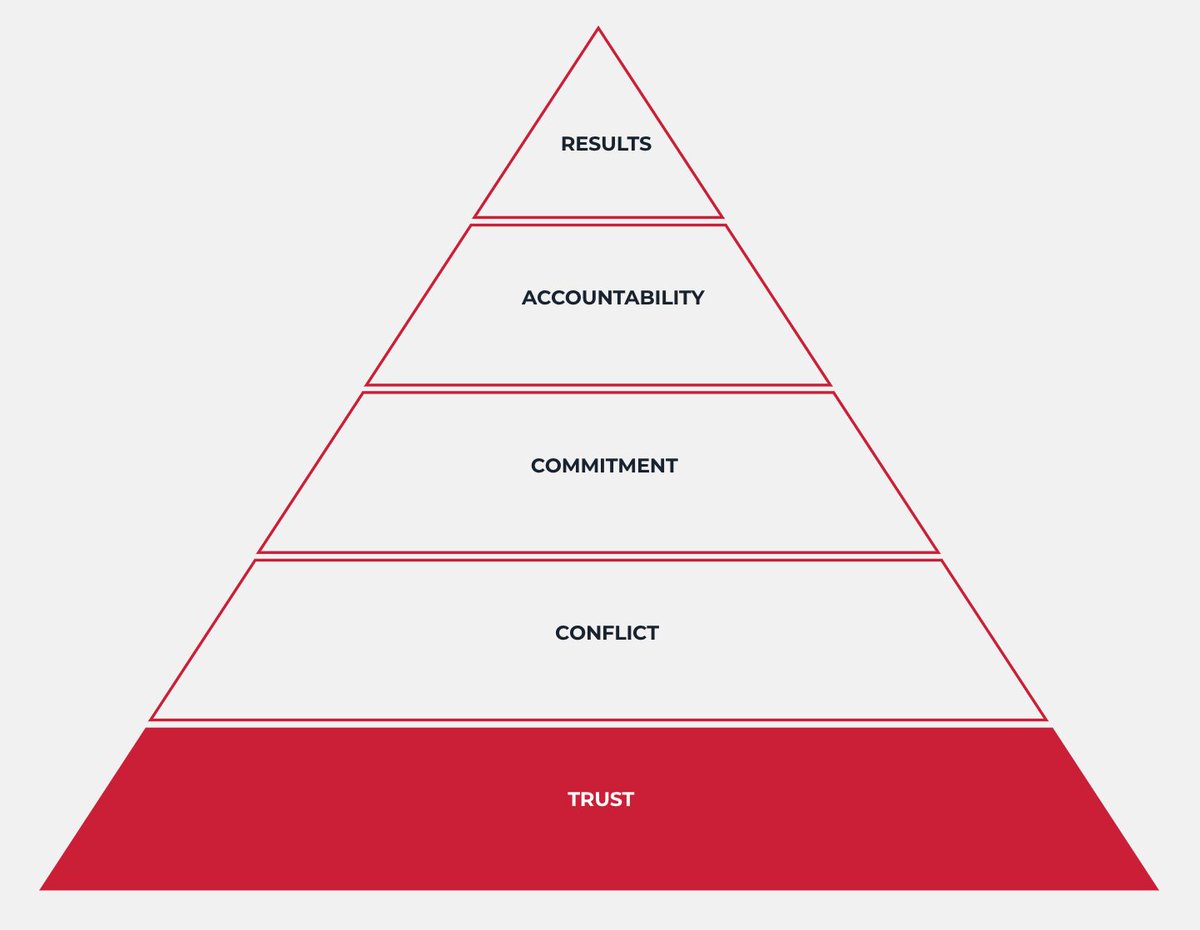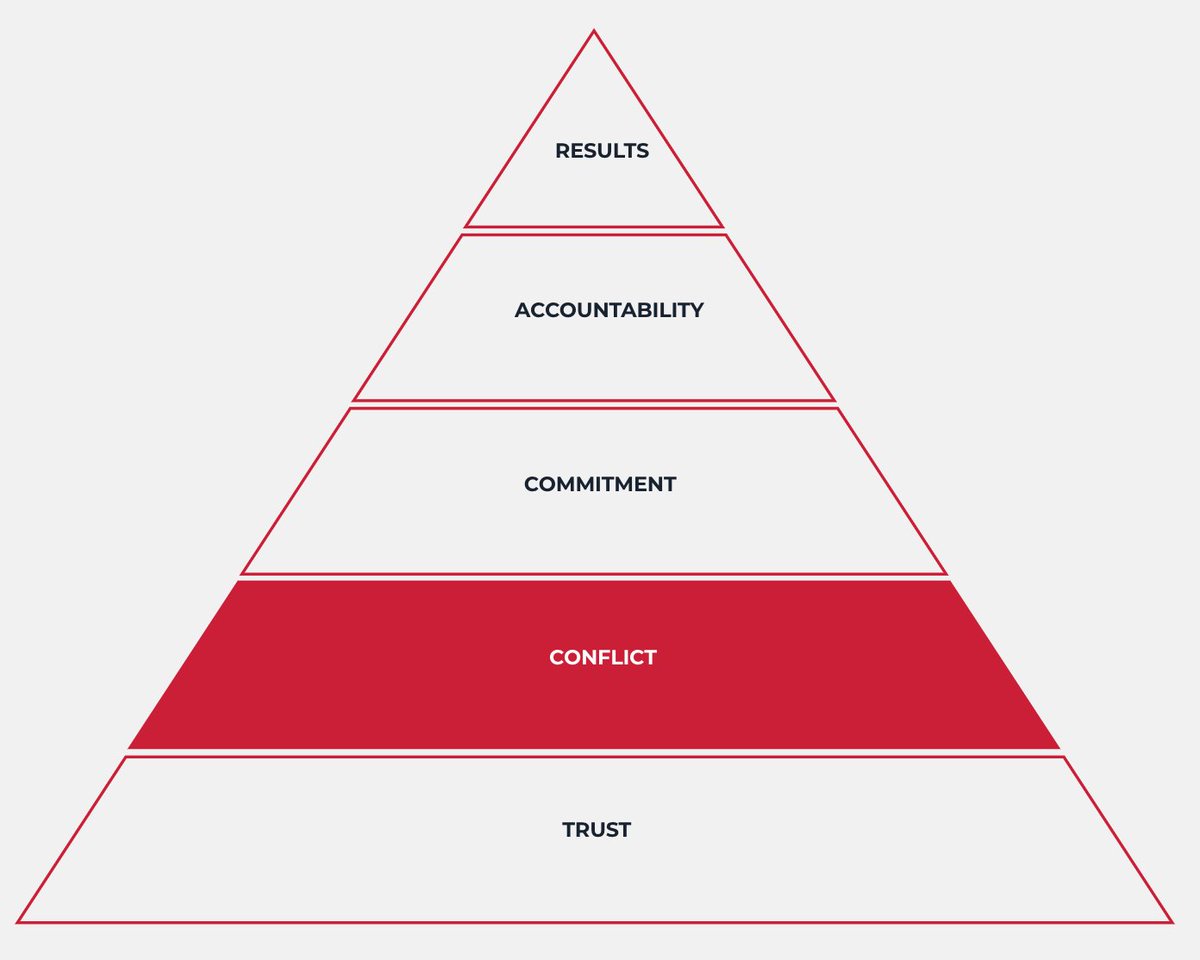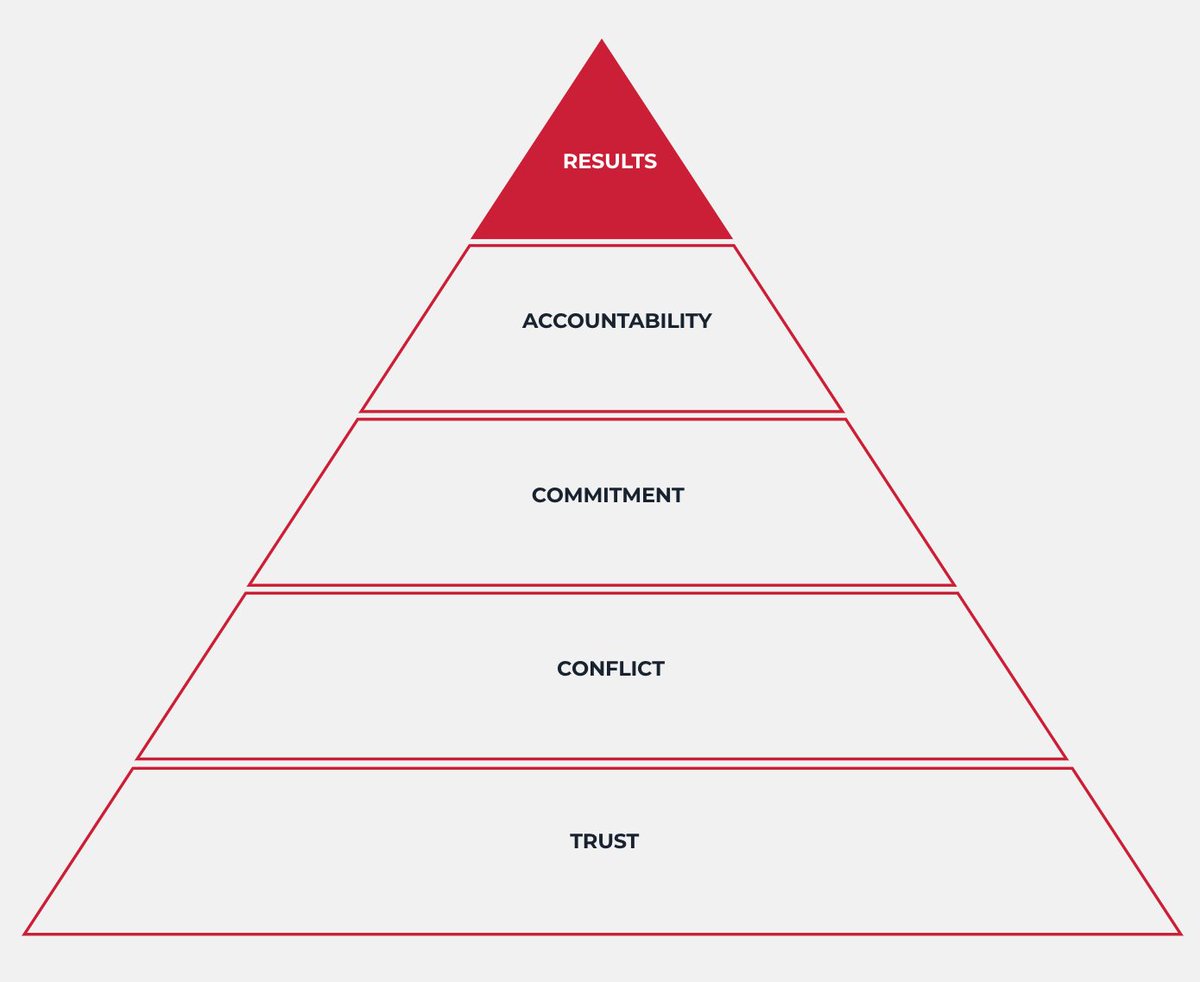These 5 traits are holding your team back at work.
THREAD: How to identify and solve the 5 dysfunctions of a team:
THREAD: How to identify and solve the 5 dysfunctions of a team:
Background: Patrick Lencioni is a pioneer of the organizational health movement.
He has written 11 books and sold over 6 million copies.
One of his most famous books being: "The Five Dysfunctions of a Team"
Here& #39;s what you need to know:
He has written 11 books and sold over 6 million copies.
One of his most famous books being: "The Five Dysfunctions of a Team"
Here& #39;s what you need to know:
The 5 dysfunctions of a team are stacked in a hierarchical pyramid (from bottom to top):
(1) Absence of Trust
(2) Fear of Conflict
(3) Lack of Commitment
(4) Avoidance of Accountability
(5) Inattention to Results
(1) Absence of Trust
(2) Fear of Conflict
(3) Lack of Commitment
(4) Avoidance of Accountability
(5) Inattention to Results
Building a strong foundation at the bottom of the pyramid is crucial to supporting the higher-level traits.
So that& #39;s where we& #39;ll start and work our way up the pyramid https://abs.twimg.com/emoji/v2/... draggable="false" alt="👇" title="Rug van hand met omlaag wijzende wijsvinger" aria-label="Emoji: Rug van hand met omlaag wijzende wijsvinger">
https://abs.twimg.com/emoji/v2/... draggable="false" alt="👇" title="Rug van hand met omlaag wijzende wijsvinger" aria-label="Emoji: Rug van hand met omlaag wijzende wijsvinger">
So that& #39;s where we& #39;ll start and work our way up the pyramid
(1) Absence of Trust:
It& #39;s hard to do anything productive if your team doesn& #39;t trust each other.
Signs that your team lacks trust:
 https://abs.twimg.com/emoji/v2/... draggable="false" alt="❌" title="Kruis" aria-label="Emoji: Kruis"> Don& #39;t ask for help
https://abs.twimg.com/emoji/v2/... draggable="false" alt="❌" title="Kruis" aria-label="Emoji: Kruis"> Don& #39;t ask for help
 https://abs.twimg.com/emoji/v2/... draggable="false" alt="❌" title="Kruis" aria-label="Emoji: Kruis"> Reluctant to be vulnerable
https://abs.twimg.com/emoji/v2/... draggable="false" alt="❌" title="Kruis" aria-label="Emoji: Kruis"> Reluctant to be vulnerable
 https://abs.twimg.com/emoji/v2/... draggable="false" alt="❌" title="Kruis" aria-label="Emoji: Kruis"> Unwilling to admit mistakes
https://abs.twimg.com/emoji/v2/... draggable="false" alt="❌" title="Kruis" aria-label="Emoji: Kruis"> Unwilling to admit mistakes
 https://abs.twimg.com/emoji/v2/... draggable="false" alt="❌" title="Kruis" aria-label="Emoji: Kruis"> Jump to conclusions about the intentions of others
https://abs.twimg.com/emoji/v2/... draggable="false" alt="❌" title="Kruis" aria-label="Emoji: Kruis"> Jump to conclusions about the intentions of others
It& #39;s hard to do anything productive if your team doesn& #39;t trust each other.
Signs that your team lacks trust:
How to fix Absence of Trust:
 https://abs.twimg.com/emoji/v2/... draggable="false" alt="✅" title="Groot wit vinkje" aria-label="Emoji: Groot wit vinkje"> Be the first to own up to a mistake
https://abs.twimg.com/emoji/v2/... draggable="false" alt="✅" title="Groot wit vinkje" aria-label="Emoji: Groot wit vinkje"> Be the first to own up to a mistake
 https://abs.twimg.com/emoji/v2/... draggable="false" alt="✅" title="Groot wit vinkje" aria-label="Emoji: Groot wit vinkje"> Admit your own weaknesses and limitations
https://abs.twimg.com/emoji/v2/... draggable="false" alt="✅" title="Groot wit vinkje" aria-label="Emoji: Groot wit vinkje"> Admit your own weaknesses and limitations
 https://abs.twimg.com/emoji/v2/... draggable="false" alt="✅" title="Groot wit vinkje" aria-label="Emoji: Groot wit vinkje"> Set a good example by asking your team members for help
https://abs.twimg.com/emoji/v2/... draggable="false" alt="✅" title="Groot wit vinkje" aria-label="Emoji: Groot wit vinkje"> Set a good example by asking your team members for help
 https://abs.twimg.com/emoji/v2/... draggable="false" alt="✅" title="Groot wit vinkje" aria-label="Emoji: Groot wit vinkje"> Help team members focus on strengths instead of weaknesses
https://abs.twimg.com/emoji/v2/... draggable="false" alt="✅" title="Groot wit vinkje" aria-label="Emoji: Groot wit vinkje"> Help team members focus on strengths instead of weaknesses
(2) Fear of Conflict:
Your team may trust each other, but do they embrace conflict?
Signs that your team is afraid of conflict:
 https://abs.twimg.com/emoji/v2/... draggable="false" alt="❌" title="Kruis" aria-label="Emoji: Kruis"> Ignore controversial topics
https://abs.twimg.com/emoji/v2/... draggable="false" alt="❌" title="Kruis" aria-label="Emoji: Kruis"> Ignore controversial topics
 https://abs.twimg.com/emoji/v2/... draggable="false" alt="❌" title="Kruis" aria-label="Emoji: Kruis"> Hesitate to voice opinions and concerns
https://abs.twimg.com/emoji/v2/... draggable="false" alt="❌" title="Kruis" aria-label="Emoji: Kruis"> Hesitate to voice opinions and concerns
 https://abs.twimg.com/emoji/v2/... draggable="false" alt="❌" title="Kruis" aria-label="Emoji: Kruis"> Worry more about office politics and personal risk management
https://abs.twimg.com/emoji/v2/... draggable="false" alt="❌" title="Kruis" aria-label="Emoji: Kruis"> Worry more about office politics and personal risk management
Your team may trust each other, but do they embrace conflict?
Signs that your team is afraid of conflict:
How to fix Fear of Conflict:
 https://abs.twimg.com/emoji/v2/... draggable="false" alt="✅" title="Groot wit vinkje" aria-label="Emoji: Groot wit vinkje"> Praise healthy examples of conflict
https://abs.twimg.com/emoji/v2/... draggable="false" alt="✅" title="Groot wit vinkje" aria-label="Emoji: Groot wit vinkje"> Praise healthy examples of conflict
 https://abs.twimg.com/emoji/v2/... draggable="false" alt="✅" title="Groot wit vinkje" aria-label="Emoji: Groot wit vinkje"> Define what healthy conflict looks like
https://abs.twimg.com/emoji/v2/... draggable="false" alt="✅" title="Groot wit vinkje" aria-label="Emoji: Groot wit vinkje"> Define what healthy conflict looks like
 https://abs.twimg.com/emoji/v2/... draggable="false" alt="✅" title="Groot wit vinkje" aria-label="Emoji: Groot wit vinkje"> Assign a "devil& #39;s advocate" in meetings
https://abs.twimg.com/emoji/v2/... draggable="false" alt="✅" title="Groot wit vinkje" aria-label="Emoji: Groot wit vinkje"> Assign a "devil& #39;s advocate" in meetings
 https://abs.twimg.com/emoji/v2/... draggable="false" alt="✅" title="Groot wit vinkje" aria-label="Emoji: Groot wit vinkje"> Give corrective feedback if conflict veers toward unhealthy
https://abs.twimg.com/emoji/v2/... draggable="false" alt="✅" title="Groot wit vinkje" aria-label="Emoji: Groot wit vinkje"> Give corrective feedback if conflict veers toward unhealthy
(3) Lack of Commitment:
If everyone doesn& #39;t buy-in, your team will be out of sync.
Signs that your team lacks commitment:
 https://abs.twimg.com/emoji/v2/... draggable="false" alt="❌" title="Kruis" aria-label="Emoji: Kruis"> Fear of failure
https://abs.twimg.com/emoji/v2/... draggable="false" alt="❌" title="Kruis" aria-label="Emoji: Kruis"> Fear of failure
 https://abs.twimg.com/emoji/v2/... draggable="false" alt="❌" title="Kruis" aria-label="Emoji: Kruis"> Lack confidence
https://abs.twimg.com/emoji/v2/... draggable="false" alt="❌" title="Kruis" aria-label="Emoji: Kruis"> Lack confidence
 https://abs.twimg.com/emoji/v2/... draggable="false" alt="❌" title="Kruis" aria-label="Emoji: Kruis"> Environment of ambiguity & confusion
https://abs.twimg.com/emoji/v2/... draggable="false" alt="❌" title="Kruis" aria-label="Emoji: Kruis"> Environment of ambiguity & confusion
 https://abs.twimg.com/emoji/v2/... draggable="false" alt="❌" title="Kruis" aria-label="Emoji: Kruis"> Spend too much time making decisions
https://abs.twimg.com/emoji/v2/... draggable="false" alt="❌" title="Kruis" aria-label="Emoji: Kruis"> Spend too much time making decisions
If everyone doesn& #39;t buy-in, your team will be out of sync.
Signs that your team lacks commitment:
How to fix Lack of Commitment:
 https://abs.twimg.com/emoji/v2/... draggable="false" alt="✅" title="Groot wit vinkje" aria-label="Emoji: Groot wit vinkje"> Define clear deadlines
https://abs.twimg.com/emoji/v2/... draggable="false" alt="✅" title="Groot wit vinkje" aria-label="Emoji: Groot wit vinkje"> Define clear deadlines
 https://abs.twimg.com/emoji/v2/... draggable="false" alt="✅" title="Groot wit vinkje" aria-label="Emoji: Groot wit vinkje"> Review key decisions at the end of meetings
https://abs.twimg.com/emoji/v2/... draggable="false" alt="✅" title="Groot wit vinkje" aria-label="Emoji: Groot wit vinkje"> Review key decisions at the end of meetings
 https://abs.twimg.com/emoji/v2/... draggable="false" alt="✅" title="Groot wit vinkje" aria-label="Emoji: Groot wit vinkje"> Have a contingency plan. This forces your team to face potential pitfalls and fear of failure head-on.
https://abs.twimg.com/emoji/v2/... draggable="false" alt="✅" title="Groot wit vinkje" aria-label="Emoji: Groot wit vinkje"> Have a contingency plan. This forces your team to face potential pitfalls and fear of failure head-on.
(4) Avoidance of Accountability:
Lack of accountability is a recipe for mediocrity.
Signs that your team avoids accountability:
 https://abs.twimg.com/emoji/v2/... draggable="false" alt="❌" title="Kruis" aria-label="Emoji: Kruis"> Missed deadlines
https://abs.twimg.com/emoji/v2/... draggable="false" alt="❌" title="Kruis" aria-label="Emoji: Kruis"> Missed deadlines
 https://abs.twimg.com/emoji/v2/... draggable="false" alt="❌" title="Kruis" aria-label="Emoji: Kruis"> Hesitate to call out peers on counterproductive behaviors
https://abs.twimg.com/emoji/v2/... draggable="false" alt="❌" title="Kruis" aria-label="Emoji: Kruis"> Hesitate to call out peers on counterproductive behaviors
 https://abs.twimg.com/emoji/v2/... draggable="false" alt="❌" title="Kruis" aria-label="Emoji: Kruis"> View corrective feedback as a personal attack
https://abs.twimg.com/emoji/v2/... draggable="false" alt="❌" title="Kruis" aria-label="Emoji: Kruis"> View corrective feedback as a personal attack
Lack of accountability is a recipe for mediocrity.
Signs that your team avoids accountability:
How to fix Avoidance of Accountability:
 https://abs.twimg.com/emoji/v2/... draggable="false" alt="✅" title="Groot wit vinkje" aria-label="Emoji: Groot wit vinkje"> Encourage peer feedback
https://abs.twimg.com/emoji/v2/... draggable="false" alt="✅" title="Groot wit vinkje" aria-label="Emoji: Groot wit vinkje"> Encourage peer feedback
 https://abs.twimg.com/emoji/v2/... draggable="false" alt="✅" title="Groot wit vinkje" aria-label="Emoji: Groot wit vinkje"> Hold regular progress reviews
https://abs.twimg.com/emoji/v2/... draggable="false" alt="✅" title="Groot wit vinkje" aria-label="Emoji: Groot wit vinkje"> Hold regular progress reviews
 https://abs.twimg.com/emoji/v2/... draggable="false" alt="✅" title="Groot wit vinkje" aria-label="Emoji: Groot wit vinkje"> Set clear standards for performance
https://abs.twimg.com/emoji/v2/... draggable="false" alt="✅" title="Groot wit vinkje" aria-label="Emoji: Groot wit vinkje"> Set clear standards for performance
 https://abs.twimg.com/emoji/v2/... draggable="false" alt="✅" title="Groot wit vinkje" aria-label="Emoji: Groot wit vinkje"> Reward team achievements (rather than individuals)
https://abs.twimg.com/emoji/v2/... draggable="false" alt="✅" title="Groot wit vinkje" aria-label="Emoji: Groot wit vinkje"> Reward team achievements (rather than individuals)
(5) Inattention to Results:
You can& #39;t have a high-performing team without the results to match.
Signs that your team has an inattention to results:
 https://abs.twimg.com/emoji/v2/... draggable="false" alt="❌" title="Kruis" aria-label="Emoji: Kruis"> Distracted from collective goals easily
https://abs.twimg.com/emoji/v2/... draggable="false" alt="❌" title="Kruis" aria-label="Emoji: Kruis"> Distracted from collective goals easily
 https://abs.twimg.com/emoji/v2/... draggable="false" alt="❌" title="Kruis" aria-label="Emoji: Kruis"> Too much concern over the pursuit of individual goals and status
https://abs.twimg.com/emoji/v2/... draggable="false" alt="❌" title="Kruis" aria-label="Emoji: Kruis"> Too much concern over the pursuit of individual goals and status
You can& #39;t have a high-performing team without the results to match.
Signs that your team has an inattention to results:
How to fix Inattention to Results:
 https://abs.twimg.com/emoji/v2/... draggable="false" alt="✅" title="Groot wit vinkje" aria-label="Emoji: Groot wit vinkje"> Clear team metrics to assess results
https://abs.twimg.com/emoji/v2/... draggable="false" alt="✅" title="Groot wit vinkje" aria-label="Emoji: Groot wit vinkje"> Clear team metrics to assess results
 https://abs.twimg.com/emoji/v2/... draggable="false" alt="✅" title="Groot wit vinkje" aria-label="Emoji: Groot wit vinkje"> Give rewards when team goals are met (e.g. extra day off, bonuses, etc.)
https://abs.twimg.com/emoji/v2/... draggable="false" alt="✅" title="Groot wit vinkje" aria-label="Emoji: Groot wit vinkje"> Give rewards when team goals are met (e.g. extra day off, bonuses, etc.)
If the team already knows how to keep each other accountable, they will push each other toward pursuing common goals.
If the team already knows how to keep each other accountable, they will push each other toward pursuing common goals.
Now that you know the 5 dysfunctions of a team, here are 5 questions to ask yourself to get started:
(1) Do your team members openly and readily disclose their opinions?
(2) Are your team meetings compelling and productive?
(1) Do your team members openly and readily disclose their opinions?
(2) Are your team meetings compelling and productive?
(3) Does your team come to decisions quickly and avoid getting bogged down by consensus?
(4) Do your team members confront one another about their shortcomings?
(5) Do your team members sacrifice their interests for the good of the team?
(4) Do your team members confront one another about their shortcomings?
(5) Do your team members sacrifice their interests for the good of the team?
If you answered "yes" to all five questions, you must be doing a pretty good job!
If you hesitated or answered "no" to any of these questions, you have some work to do.
Consider having your team take the full assessment online. (It was beneficial in my experience!)
If you hesitated or answered "no" to any of these questions, you have some work to do.
Consider having your team take the full assessment online. (It was beneficial in my experience!)
Thanks for reading!
For more tips on:
• Marketing
• Business growth
• Audience building
Follow me @joe_portsmouth
For more tips on:
• Marketing
• Business growth
• Audience building
Follow me @joe_portsmouth
TL;DR - the 5 dysfunctions of a team are:
(1) Absence of Trust
(2) Fear of Conflict
(3) Lack of Commitment
(4) Avoidance of Accountability
(5) Inattention to Results
Start by addressing (1) and working your way up the pyramid to build a high-performing team.
(1) Absence of Trust
(2) Fear of Conflict
(3) Lack of Commitment
(4) Avoidance of Accountability
(5) Inattention to Results
Start by addressing (1) and working your way up the pyramid to build a high-performing team.

 Read on Twitter
Read on Twitter

 Don& #39;t ask for helphttps://abs.twimg.com/emoji/v2/... draggable="false" alt="❌" title="Kruis" aria-label="Emoji: Kruis"> Reluctant to be vulnerablehttps://abs.twimg.com/emoji/v2/... draggable="false" alt="❌" title="Kruis" aria-label="Emoji: Kruis"> Unwilling to admit mistakeshttps://abs.twimg.com/emoji/v2/... draggable="false" alt="❌" title="Kruis" aria-label="Emoji: Kruis"> Jump to conclusions about the intentions of others" title="(1) Absence of Trust:It& #39;s hard to do anything productive if your team doesn& #39;t trust each other.Signs that your team lacks trust:https://abs.twimg.com/emoji/v2/... draggable="false" alt="❌" title="Kruis" aria-label="Emoji: Kruis"> Don& #39;t ask for helphttps://abs.twimg.com/emoji/v2/... draggable="false" alt="❌" title="Kruis" aria-label="Emoji: Kruis"> Reluctant to be vulnerablehttps://abs.twimg.com/emoji/v2/... draggable="false" alt="❌" title="Kruis" aria-label="Emoji: Kruis"> Unwilling to admit mistakeshttps://abs.twimg.com/emoji/v2/... draggable="false" alt="❌" title="Kruis" aria-label="Emoji: Kruis"> Jump to conclusions about the intentions of others" class="img-responsive" style="max-width:100%;"/>
Don& #39;t ask for helphttps://abs.twimg.com/emoji/v2/... draggable="false" alt="❌" title="Kruis" aria-label="Emoji: Kruis"> Reluctant to be vulnerablehttps://abs.twimg.com/emoji/v2/... draggable="false" alt="❌" title="Kruis" aria-label="Emoji: Kruis"> Unwilling to admit mistakeshttps://abs.twimg.com/emoji/v2/... draggable="false" alt="❌" title="Kruis" aria-label="Emoji: Kruis"> Jump to conclusions about the intentions of others" title="(1) Absence of Trust:It& #39;s hard to do anything productive if your team doesn& #39;t trust each other.Signs that your team lacks trust:https://abs.twimg.com/emoji/v2/... draggable="false" alt="❌" title="Kruis" aria-label="Emoji: Kruis"> Don& #39;t ask for helphttps://abs.twimg.com/emoji/v2/... draggable="false" alt="❌" title="Kruis" aria-label="Emoji: Kruis"> Reluctant to be vulnerablehttps://abs.twimg.com/emoji/v2/... draggable="false" alt="❌" title="Kruis" aria-label="Emoji: Kruis"> Unwilling to admit mistakeshttps://abs.twimg.com/emoji/v2/... draggable="false" alt="❌" title="Kruis" aria-label="Emoji: Kruis"> Jump to conclusions about the intentions of others" class="img-responsive" style="max-width:100%;"/>
 Ignore controversial topicshttps://abs.twimg.com/emoji/v2/... draggable="false" alt="❌" title="Kruis" aria-label="Emoji: Kruis"> Hesitate to voice opinions and concernshttps://abs.twimg.com/emoji/v2/... draggable="false" alt="❌" title="Kruis" aria-label="Emoji: Kruis"> Worry more about office politics and personal risk management" title="(2) Fear of Conflict:Your team may trust each other, but do they embrace conflict?Signs that your team is afraid of conflict:https://abs.twimg.com/emoji/v2/... draggable="false" alt="❌" title="Kruis" aria-label="Emoji: Kruis"> Ignore controversial topicshttps://abs.twimg.com/emoji/v2/... draggable="false" alt="❌" title="Kruis" aria-label="Emoji: Kruis"> Hesitate to voice opinions and concernshttps://abs.twimg.com/emoji/v2/... draggable="false" alt="❌" title="Kruis" aria-label="Emoji: Kruis"> Worry more about office politics and personal risk management" class="img-responsive" style="max-width:100%;"/>
Ignore controversial topicshttps://abs.twimg.com/emoji/v2/... draggable="false" alt="❌" title="Kruis" aria-label="Emoji: Kruis"> Hesitate to voice opinions and concernshttps://abs.twimg.com/emoji/v2/... draggable="false" alt="❌" title="Kruis" aria-label="Emoji: Kruis"> Worry more about office politics and personal risk management" title="(2) Fear of Conflict:Your team may trust each other, but do they embrace conflict?Signs that your team is afraid of conflict:https://abs.twimg.com/emoji/v2/... draggable="false" alt="❌" title="Kruis" aria-label="Emoji: Kruis"> Ignore controversial topicshttps://abs.twimg.com/emoji/v2/... draggable="false" alt="❌" title="Kruis" aria-label="Emoji: Kruis"> Hesitate to voice opinions and concernshttps://abs.twimg.com/emoji/v2/... draggable="false" alt="❌" title="Kruis" aria-label="Emoji: Kruis"> Worry more about office politics and personal risk management" class="img-responsive" style="max-width:100%;"/>
 Fear of failurehttps://abs.twimg.com/emoji/v2/... draggable="false" alt="❌" title="Kruis" aria-label="Emoji: Kruis"> Lack confidencehttps://abs.twimg.com/emoji/v2/... draggable="false" alt="❌" title="Kruis" aria-label="Emoji: Kruis"> Environment of ambiguity & confusionhttps://abs.twimg.com/emoji/v2/... draggable="false" alt="❌" title="Kruis" aria-label="Emoji: Kruis"> Spend too much time making decisions" title="(3) Lack of Commitment:If everyone doesn& #39;t buy-in, your team will be out of sync.Signs that your team lacks commitment:https://abs.twimg.com/emoji/v2/... draggable="false" alt="❌" title="Kruis" aria-label="Emoji: Kruis"> Fear of failurehttps://abs.twimg.com/emoji/v2/... draggable="false" alt="❌" title="Kruis" aria-label="Emoji: Kruis"> Lack confidencehttps://abs.twimg.com/emoji/v2/... draggable="false" alt="❌" title="Kruis" aria-label="Emoji: Kruis"> Environment of ambiguity & confusionhttps://abs.twimg.com/emoji/v2/... draggable="false" alt="❌" title="Kruis" aria-label="Emoji: Kruis"> Spend too much time making decisions" class="img-responsive" style="max-width:100%;"/>
Fear of failurehttps://abs.twimg.com/emoji/v2/... draggable="false" alt="❌" title="Kruis" aria-label="Emoji: Kruis"> Lack confidencehttps://abs.twimg.com/emoji/v2/... draggable="false" alt="❌" title="Kruis" aria-label="Emoji: Kruis"> Environment of ambiguity & confusionhttps://abs.twimg.com/emoji/v2/... draggable="false" alt="❌" title="Kruis" aria-label="Emoji: Kruis"> Spend too much time making decisions" title="(3) Lack of Commitment:If everyone doesn& #39;t buy-in, your team will be out of sync.Signs that your team lacks commitment:https://abs.twimg.com/emoji/v2/... draggable="false" alt="❌" title="Kruis" aria-label="Emoji: Kruis"> Fear of failurehttps://abs.twimg.com/emoji/v2/... draggable="false" alt="❌" title="Kruis" aria-label="Emoji: Kruis"> Lack confidencehttps://abs.twimg.com/emoji/v2/... draggable="false" alt="❌" title="Kruis" aria-label="Emoji: Kruis"> Environment of ambiguity & confusionhttps://abs.twimg.com/emoji/v2/... draggable="false" alt="❌" title="Kruis" aria-label="Emoji: Kruis"> Spend too much time making decisions" class="img-responsive" style="max-width:100%;"/>
 Missed deadlineshttps://abs.twimg.com/emoji/v2/... draggable="false" alt="❌" title="Kruis" aria-label="Emoji: Kruis"> Hesitate to call out peers on counterproductive behaviorshttps://abs.twimg.com/emoji/v2/... draggable="false" alt="❌" title="Kruis" aria-label="Emoji: Kruis"> View corrective feedback as a personal attack" title="(4) Avoidance of Accountability:Lack of accountability is a recipe for mediocrity.Signs that your team avoids accountability:https://abs.twimg.com/emoji/v2/... draggable="false" alt="❌" title="Kruis" aria-label="Emoji: Kruis"> Missed deadlineshttps://abs.twimg.com/emoji/v2/... draggable="false" alt="❌" title="Kruis" aria-label="Emoji: Kruis"> Hesitate to call out peers on counterproductive behaviorshttps://abs.twimg.com/emoji/v2/... draggable="false" alt="❌" title="Kruis" aria-label="Emoji: Kruis"> View corrective feedback as a personal attack" class="img-responsive" style="max-width:100%;"/>
Missed deadlineshttps://abs.twimg.com/emoji/v2/... draggable="false" alt="❌" title="Kruis" aria-label="Emoji: Kruis"> Hesitate to call out peers on counterproductive behaviorshttps://abs.twimg.com/emoji/v2/... draggable="false" alt="❌" title="Kruis" aria-label="Emoji: Kruis"> View corrective feedback as a personal attack" title="(4) Avoidance of Accountability:Lack of accountability is a recipe for mediocrity.Signs that your team avoids accountability:https://abs.twimg.com/emoji/v2/... draggable="false" alt="❌" title="Kruis" aria-label="Emoji: Kruis"> Missed deadlineshttps://abs.twimg.com/emoji/v2/... draggable="false" alt="❌" title="Kruis" aria-label="Emoji: Kruis"> Hesitate to call out peers on counterproductive behaviorshttps://abs.twimg.com/emoji/v2/... draggable="false" alt="❌" title="Kruis" aria-label="Emoji: Kruis"> View corrective feedback as a personal attack" class="img-responsive" style="max-width:100%;"/>
 Distracted from collective goals easilyhttps://abs.twimg.com/emoji/v2/... draggable="false" alt="❌" title="Kruis" aria-label="Emoji: Kruis"> Too much concern over the pursuit of individual goals and status" title="(5) Inattention to Results:You can& #39;t have a high-performing team without the results to match.Signs that your team has an inattention to results:https://abs.twimg.com/emoji/v2/... draggable="false" alt="❌" title="Kruis" aria-label="Emoji: Kruis"> Distracted from collective goals easilyhttps://abs.twimg.com/emoji/v2/... draggable="false" alt="❌" title="Kruis" aria-label="Emoji: Kruis"> Too much concern over the pursuit of individual goals and status" class="img-responsive" style="max-width:100%;"/>
Distracted from collective goals easilyhttps://abs.twimg.com/emoji/v2/... draggable="false" alt="❌" title="Kruis" aria-label="Emoji: Kruis"> Too much concern over the pursuit of individual goals and status" title="(5) Inattention to Results:You can& #39;t have a high-performing team without the results to match.Signs that your team has an inattention to results:https://abs.twimg.com/emoji/v2/... draggable="false" alt="❌" title="Kruis" aria-label="Emoji: Kruis"> Distracted from collective goals easilyhttps://abs.twimg.com/emoji/v2/... draggable="false" alt="❌" title="Kruis" aria-label="Emoji: Kruis"> Too much concern over the pursuit of individual goals and status" class="img-responsive" style="max-width:100%;"/>


